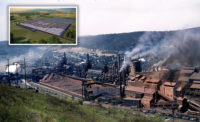Stantec Consulting Services Inc. will design an estimated $800-million lithium-ion battery cell plant near Vancouver, British Columbia. which would be Canada's largest for producing high-performance batteries used in vehicles and for other consumer and manufacturing applications.
Stantec will provide planning, architecture, engineering, environmental and other consulting and commissioning services for the facility, with construction to start by mid-2024.
E-One Moli Energy Canada Ltd., a unit of a Taiwan-based cement firm, is building the plant to produce 135 million cells annually used in batteries for medical devices, power tools, consumer electronics, vehicles and aerospace applications.
The Maple Ridge, B.C., project, set to operate by 2028, will include about $209 million in direct federal and provincial funding and is viewed as an alternative to battery products currently made mostly in Asia, said Prime Minister Justin Trudeau.
An RFQ will be made available to general contractors in January with construction following demolition of the existing facility, said E-One Moli Energy Canada Vice President Frank So.
“We need someone with experience building a facility of this size, about 474,000 square ft, and in particular someone who has experience in battery manufacturing construction or at least in a similar type of industry,” he said.
With a production capacity of 2.8 GWh, the new plant is intended to anchor the company’s North American production of lithium-ion batteries and create a British Columbia hub in the global battery component supply chain.
“We are building clean energy here, that’s our vision,” So told ENR. “We’re planning for full hydro-electricity to power the factory that will also be built to LEED Gold and Net Zero Carbon certifications.”
In addition to an administrative building made entirely of engineered wood, plans call for an energy storage system to avoid reliance on stationary or portable generators and a research center with a fully integrated green roof—elements that would make it one of the most sustainable industrial buildings in the region, according to E-One Moli Energy Canada.
Part of the agreement also involves transitioning some plant operations from natural gas to electricity to align with the province’s commitment to advancing clean technology, the firm said.
British Columbia has legislated targets to cut greenhouse gas emissions 40% below 2007 levels by 2030; 60% by 2040; and 80% by 2050.
E-One Moli Energy Canada has operated a plant making cell phone and laptop batteries in Maple Ridge since the late 1980s but downsized operations to R&D and cut staff in 2008 due to high overhead and the financial crisis. The parent firm, Taiwan Cement Corp., owns three lithium-ion cell manufacturing plants in that nation.




